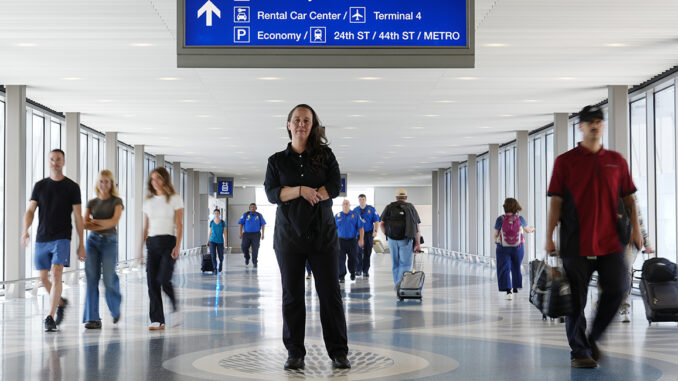
Mel Nichols, a 37-year-old bartender in Phoenix, Arizona, takes home anywhere from $30 to $50 an hour with tips included. But the uncertainty of how much she’s going to make on a daily basis is a constant source of stress.
“For every good day, there’s three bad days,” said Nichols, who has been in the service industry since she was a teenager. “You have no security when it comes to knowing how much you’re going to make.”
That uncertainty exists largely because federal labor law allows businesses to pay tipped workers, like food servers, bartenders and bellhops, less than the minimum wage as long as customer tips make up the difference. Voters in Arizona and Massachusetts will decide in November whether it’s good policy to continue to let employers pass some of their labor costs to consumers.
The ballot measures reflect an accelerating debate over the so-called subminimum wage, which advocates say is essential to the sustainability of the service industry and detractors say pushes the cost of labor off employers’ shoulders and leads to the exploitation of workers.
Fourteen states pay the federal minimum, or just above $2 an hour for tipped workers and $7 an hour for non-tipped workers.
Arizona employers can pay their tipped workers $3 less hourly than other workers. Under current rates, that means tipped workers’ base pay is $11.35 an hour.
Voters will decide whether to approve a measure backed by state Republicans and the Arizona Restaurant Association to change the minimum for tipped workers to 25% less than the regular minimum wage as long as their pay with tips is $2 above that minimum.
The hourly minimum wage in Arizona is currently $14.35 and increases yearly according to inflation.
Voters in Massachusetts are being asked to eliminate the tiered minimum-wage system.
There, voters will decide on a measure to incrementally increase the state’s tipped worker wage — currently $6.75 per hour — until it meets the regular minimum wage by January 2029. The measure was put forward by One Fair Wage, a not-for-profit that works to end the subminimum wage.
If voters approve the measure, the Bay State would join seven states that currently have a single minimum wage. Michigan will soon join that group after an August state Supreme Court ruling initiated a phase-out of the subminimum wage.
And the minimum wage is figuring into the presidential race, where both former President Donald Trump and Vice President Kamala Harris want to eliminate federal taxes on workers’ tips.
Employers must ensure that workers get the full minimum if they don’t make that much with tips. But they don’t always comply with federal labor law. One in 10 restaurants and bars investigated nationally by the U.S. Labor Department between 2010 and 2019 violated a provision of the Fair Labor Standards Act, resulting in the establishments paying $113.9 million in back wages.
The issue disproportionately affects women, who make up about 47% of the U.S. workforce but nearly 70% of those who work in tipped professions, according to an AP analysis of U.S. Census data.
In Arizona, Republican state Sen. J.D. Mesnard, the sponsor of Proposition 138, said the measure is a win for both businesses and lower-wage workers.
“The employer is protected in the sense that they can preserve this lower base, knowing that there are going to be tips on top of it,” Mesnard said. “The tipped worker is guaranteed to make more than minimum wage, which is more than they’re guaranteed today.”
Proposition 138 was initially put forward as a response to a ballot measure pushed by One Fair Wage that would create a single minimum wage of $18, but the group abandoned the effort after threats of litigation from the restaurant association over how it collected signatures.
Instead, One Fair Wage will focus on trying to pass a wage hike in the Legislature. Democratic State Rep. Mariana Sandoval said she hopes her party can flip the Legislature, where Republicans hold a one-seat majority in both chambers.
After working for tips for more than 20 years, server Lindsay Ruck, who works at a restaurant at Phoenix Sky Harbor International Airport, said she’s faced her fair share of belligerent customers. But because their tips make up such a significant part of her pay — approximately $60 an hour — she’s hesitant to stand up to them.
To Ruck, higher base pay — not less — is called for.
“I think that there should be just a single minimum wage and then people should get tipped on top of that,” Ruck said.
